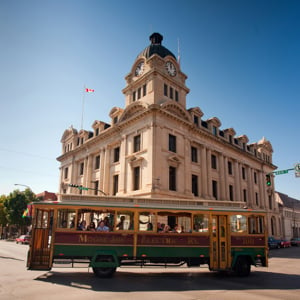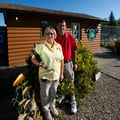Careers in recreation and entertainment include working in museums, attractions, parks, outfitting and events and conferences, to name a few.
In Saskatchewan, careers in recreation and entertainment provide opportunities for people who enjoy sharing their knowledge of local culture and their love of the outdoors.
 Freshwater fishing guides organize and conduct fishing expeditions. In Saskatchewan, they most often work for outfitting camps. They may take visitors for a day trip or for an excursion that lasts several days. They work to minimize environmental impact, plan trips and educate others on the basics of fishing.
Freshwater fishing guides organize and conduct fishing expeditions. In Saskatchewan, they most often work for outfitting camps. They may take visitors for a day trip or for an excursion that lasts several days. They work to minimize environmental impact, plan trips and educate others on the basics of fishing.
A high school diploma or equivalent is preferred. Fishing experience, as well as knowledge of the terrain, environment, and local area, is required. Knowledge of local history is an asset. Standard First Aid and CPR training at minimum with Wilderness First Aid is recommended. A Canadian Pleasure Craft Operator Card (PCOC) is required. Small Non-Pleasure Vessel Basic Safety (MED A3) and Small Vessel Operator Proficiency Training (SVOP) courses and certifications are desirable, particularly if you are guiding on the large lakes.
Training and certification:
 Hunting guides build on their natural survival and leadership skills to organize and conduct expeditions for hunters. In Saskatchewan, they operate outfitting camps or work for licensed outfitters. They teach others the essential elements of hunting, while providing a meaningful, safe and enjoyable wilderness experience. Hunting trips may last a day or several days.
Hunting guides build on their natural survival and leadership skills to organize and conduct expeditions for hunters. In Saskatchewan, they operate outfitting camps or work for licensed outfitters. They teach others the essential elements of hunting, while providing a meaningful, safe and enjoyable wilderness experience. Hunting trips may last a day or several days.
A high school diploma or equivalent is preferred. Hunting experience, as well as knowledge and familiarity of the terrain, environment and local area, is required. Knowledge of local history is an asset. Standard First Aid, CPR and Wilderness First Aid are recommended. A firearm safety/hunter education certificate is required. A driver’s license is required.
Training and certification:
 Outdoor adventure guides organize and conduct expeditions for sport enthusiasts, adventurers and resort guests. They work for adventure tourism companies, resorts, parks, lodges, campgrounds or operate their own small business. They might take clients canoeing, kayaking, biking, hiking, or dogsledding, depending on their skills. They may provide day trips or trips spanning several days.
Outdoor adventure guides organize and conduct expeditions for sport enthusiasts, adventurers and resort guests. They work for adventure tourism companies, resorts, parks, lodges, campgrounds or operate their own small business. They might take clients canoeing, kayaking, biking, hiking, or dogsledding, depending on their skills. They may provide day trips or trips spanning several days.
A high school diploma or equivalent is preferred. Knowledge and familiarity of the terrain, environment and local area is required. Some outdoor adventure activities, such as canoeing or kayaking, require special training or certification. Certification information will be available from the associations that govern the sport, such as Paddle Canada. Standard First Aid, CPR and Wilderness First Aid are recommended. Knowledge of local history is an asset.
Training and certification:
 Recreation co-ordinators manage, promote and develop recreation, sport and leisure programs within their communities. They may supervise recreation staff or instructors. They are responsible for the recreation budget and may develop recreation policies and practices. The recreation co-ordinator delivers programs that provide opportunities for youth, recreation and sports activities and promote a healthy lifestyle for community residents and visitors of all ages.
Recreation co-ordinators manage, promote and develop recreation, sport and leisure programs within their communities. They may supervise recreation staff or instructors. They are responsible for the recreation budget and may develop recreation policies and practices. The recreation co-ordinator delivers programs that provide opportunities for youth, recreation and sports activities and promote a healthy lifestyle for community residents and visitors of all ages.
A diploma or degree in recreation administration or recreation management is required. Demonstrated skills in customer service, written and verbal communication, leadership and teamwork are desirable. Standard First Aid and CPR is desirable
Programs Available
 Tour guides accompany visitors or groups on short trips, sight seeing tours or visits to attractions. They provide information, deliver commentary, answer questions and ensure the itinerary is met. They may develop tours or may be hired to deliver ready-made tours.
Tour guides accompany visitors or groups on short trips, sight seeing tours or visits to attractions. They provide information, deliver commentary, answer questions and ensure the itinerary is met. They may develop tours or may be hired to deliver ready-made tours.
A high school diploma or equivalent is required. A university degree or college diploma in tourism or history is an asset. Customer service training is recommended. In-depth knowledge of local geography, history, culture and attractions is required. First aid and CPR is an asset.
Training and certification:
 The successful owner of an outfitting business in Saskatchewan performs a wide range of responsibilities, including business planning, licensing requirements, daily operations, finance, accounting, human resource management, marketing and sales. An Outfitter must continuously review and update business plans and monitor accounting and cash control to ensure the overall operation of the establishment is in line with predictions.
The successful owner of an outfitting business in Saskatchewan performs a wide range of responsibilities, including business planning, licensing requirements, daily operations, finance, accounting, human resource management, marketing and sales. An Outfitter must continuously review and update business plans and monitor accounting and cash control to ensure the overall operation of the establishment is in line with predictions.
Outfitters in Saskatchewan are seasonal and offer experience-based product, usually hunting or fishing. Depending on the size of the business, outfitters may lead the activities themselves, or hire staff to assist. To become a hunting or fishing outfitter in Saskatchewan, you must purchase an existing outfitting business and be licensed by the Ministry of the Environment.
A high school diploma or equivalent is an asset. A college diploma or degree in business, tourism, marketing and/or management is useful. First aid, CPR and Wilderness First Aid is highly recommended. Significant experience working as a guide is an asset.
Training and certification:
Parks managers in Saskatchewan may work in federal, provincial or regional parks. They are responsible for managing parks and delivering tourism programs and services in accordance with legislation and policy procedures. Parks managers also develop programs and initiatives focused on customer goals and the promotion of tourism. developing new products and promoting tourism.
A college diploma or degree in business, tourism, marketing and/or management or the equivalent is required. A Class 5 driver's license is required. Skills in customer service, communication, financial management and leadership are an asset. Hands-on experience in entry-level jobs in parks, including areas of maintenance, entry gate, office, and nature/historic interpreting will be valuable.
Training and certification:
Saskatchewan's Ministry of Parks, Culture and Sport hires seasonal conservation officers to act as park officers during the summer season. Seasonal officers report to a full-time senior conservation officer. Seasonal officers are responsible for the enforcement of, and compliance with, legislation and policy within the parks. They ensure park spaces, facilities and campgrounds are safe and enjoyable, protected and well-kept. Officers work shifts, including day, evening and nights.
The main role of a seasonal conservation officer is to solve problems that park users encounter or create. Simply put, officers help the public safely enjoy their holidays, while protecting the natural resources found in Saskatchewan's provincial parks.
A diploma in a two-year natural resource law program from a recognized post secondary college or university. Once hired, you'll receive the required training to be a seasonal conservation officer. Customer service and verbal communication skills are necessary. A Class 5 driver’s licence is required. First aid, CPR and Wilderness First Aid is an asset.
Training and certification:
Heritage Interpreters help others understand and appreciate cultural or natural heritage sites or attractions. They work in many different settings, from parks and museums to archeological sites, visitor centres and city tours. Interpreters do not simply lecture; they have a complete understanding of their subject matter and share their interest and knowledge with others. The different audiences make this position interesting and stimulating.
A high school diploma or equivalent is required. A related degree in tourism is an asset. Experience in research is necessary. First Aid training and customer service training are useful.
Training and certification:
Event co-ordinators assist in the preparation, implementation, execution and evaluation of special events. They help with human resource coordination by recruiting, training and motivating staff and volunteers. It is a job that requires creativity and the use of many talents. Event co-ordinator positions may be short-term contracts, and many event co-ordinators move from contract to contract and event to event.
A high school diploma or equivalent is required. A diploma or degree in communications, marketing, business administration or tourism management is usually required. Desired experience and skills include negotiation, arbitration, accounting, public relations, marketing and human resource / volunteer management, as well as knowledge of the local area and industry.
Training and certification:
Event managers are responsible for the planning, design, production, promotion, overall coordination and profitability of an event. They delegate many of the tasks and then oversee and support those they delegated to. This is a creative position that sometimes allows for opportunities to test new ideas and themes. Like an event co-ordinator, those who make a career of event management often move from one contract to another.
A high school diploma or equivalent is required. A diploma or degree in marketing communication, public relations of business is usually necessary. Experience in coordination and managing events is necessary. Fundraising experience is an asset.
Training and certification:
Tourism Saskatchewan's Guide to Tourism Careers in Saskatchewan provides detailed descriptions of 45 career opportunities out of the hundreds of occupations available in all five industries that make up the tourism sector of the economy. Each industry, covered in its own module, includes an overview, career profiles, main duties, recommended education and training. Each career description includes a personal feature about someone in Saskatchewan who is doing that work. A bonus module provides links to tourism training and post-secondary programs that support the professional development of tourism employees. Information is provided on programs available from Tourism Saskatchewan, Saskatoon and Regina Industry Education Councils, Saskatchewan Apprenticeship and Trade Certification Commission, Saskatchewan Polytechnic, the University of Saskatchewan, and the University of Regina, as well as private colleges and trainers. This guide includes infographics showing the career progression journeys that are possible in culinary, international special events and hospitality.
Explore Tourism Careers is an interactive online presentation that provides teachers, career counsellors and high school students with an overview of the career opportunities available in the tourism sector in Saskatchewan. This short presentation explores four areas that answer students' and teachers' most-asked questions about building a successful tourism career.
These online resources always contain the most up-to-date information and are revised regularly.